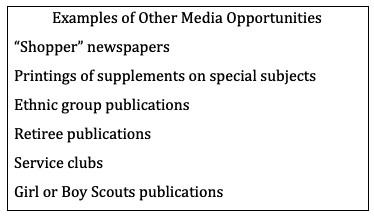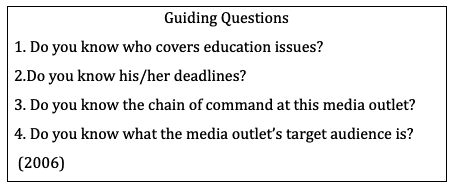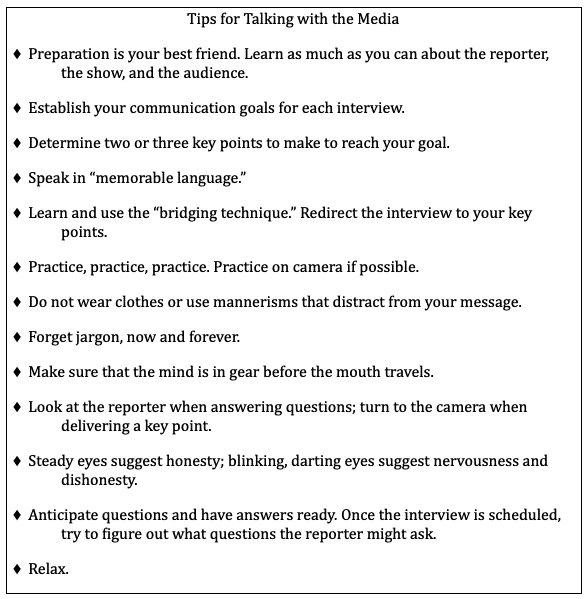Knowing what is newsworthy about school activities helps maximize media coverage is key for media for school leaders. It’s an age when people have incredible access to information. The media provides information 24/7 through television, radio, print media, and the Internet. Whether we are attempting to provide a positive image to the public and key decision-makers or dealing with a crisis, one of the most effective keys of sharing fast-breaking information with the public is to tap into this information stream. We need to know what is newsworthy about our school’s activities and work with the media to maximize coverage.
The traditional media has many forms that include local and state newspapers, television, radio, and magazines. But there are other media opportunities that move beyond the common options. It’s important to consider all the media possibilities available to you.

Identifying Media Outlets
In order to successfully use the media, you must first understand the types of media available to you. Your success will depend on a media list that must be continually updated. Consider TV, Streaming Video, Radio, Podcasts, Newspapers, Newsletters, and Blogs.
Determining Key People
Second, you will need to determine the specific personnel who are important. There are four questions that, when answered, can help you identify the persons in the media with whom you plan to collaborate.

Building Relationships
Developing positive strategic relationships with media personnel is the third step. Building a relationship takes time, and requires persistence and effort on your part. There are several key actions you can take to develop a relationship with key people. First, establish a repeatable pattern that integrates Twitter and email to engage media without annoying them. This increases your visibility and positions you as a resource and potential source of information. Next, develop a specific process so they will take your calls and meet with you in person. Maximize an in-person media visit or phone call. Go above and beyond the usual expectations. This will set you apart from others, who are more passive in their dealings with the media. Finally, regular contact is always a plus in relationships. In subtle ways, keep yourself in the forefront of all the people with whom they deal.
Effective Media Interviews
Fourth, you want to improve your effectiveness when interviewing with the media. You want to be sure your message comes across. However, people in the media also have an agenda. For them, reporting includes the basics: “who”, ”what,” ”when,” “where,” “why,” and “how.” Anticipating these questions will help prepare you for interviews. Additionally, keep in mind the following tips.

There are six additional hints for successful interviews:
1.) Understand the ground rules for working with reporters
2.) Create memorable media messages
3.) Deliver a winning interview and answer tough questions
4.) Adjust your approach for print, radio, TV, and social media
5.) Use positive body language that reinforces your message
6.) Prepare for and manage a media crisis (Phillips, 2013)
Develop a Media Team
The fifth step in the media process is the selection of a media team or sub-committee. Due to the range of traditional media, as well as social media, opportunities, it is unrealistic to ask one person to fulfill all the responsibilities. When Barbara was teaching, the local newspaper ran a monthly page of education news. Schools were encouraged to provide information. As the newspaper faculty sponsor, Barbara assigned one student to write the monthly column. Although she and the principal provided guidance and reviewed the column, the student generally handled it. Consider your personnel resources and build on their strengths to develop your group. Finally, be sure each member of your team understands his or her role, guidelines, and any limitations.
Final Thoughts
Traditional media is still a powerful advocacy tool. Identify key media outlets, prepare for effective interviews, enhance your writing skills, develop your team, and utilize the media to get your message across.
References:
Advocacy from A to Z (2017) by Robert Blackburn, Barbara Blackburn, and Ron Williamson.
Phillips, B. (2013). The media training bible. Washington, DC: SpeakGood Press.
- The Missourian – Technology Brings Changes to Libraries – Media Centers Busy at Schools
- EdSurge – 8 Ways Schools Can Form a Better Relationship With the Media
- The New York Times – Should Schools Teach Mindfulness?


